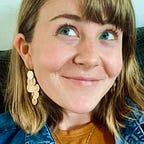Lessons from Your Friendly Neighborhood Astronomer
Meet Your Friendly, Neighborhood Astronomer
This is the cornerstone post for a new series, covering fundamental topics in astronomy and connecting them to recent discoveries and newsworthy events. To start, author Briley Lewis shares her personal experiences in science and her motivation to write about science.
“You know that’s over my head, but so impressive you’re doing it!”
“You’ve always been the smart one. I could never understand things like that.”
“I just can’t get things like that, it’s not how my brain works. Good for you.”
Graduate school is often quite an isolating and stressful experience, and a strong support network can be key in making it through. However, when the people in your support network believe they cannot understand science, it can feel like they are closing themselves off from discussions about the majority of your life.
This barrier in understanding creates distance in relationships, leaving people feeling like they’re in different worlds. As the only person in my extended family to pursue a PhD, and the only one to go to graduate school for science, sometimes I feel like the odd one out. There is a lot of internalized inadequacy and shame when it comes to science and math in our culture, and “being a scientist” is still a mysterious career path to many. But in personal conversations, when someone says they don’t think they can ever understand science, it can come across as “I don’t care to take the time to try” or “I’m just not that interested in what you have to say.” It feels so dismissive.
I remind myself, though, that I need to take a step back from these situations in which my most vulnerable feelings are involved.
In reality, people are likely just dealing with the effects of a lifetime of poor teaching and negative messaging, reinforced by scientific articles and news that isn’t explained at their current level of understanding. Their comments all share a fundamentally flawed belief: that some people just don’t have what it takes to learn science. This is known as a “fixed mindset” — the idea that you have certain innate talents and that’s what you’re stuck with. Educators are increasingly trying to encourage a growth mindset in their students, where students approach learning with the idea that skills and understanding can be developed with effort and effective teaching.
I’ll wholeheartedly take some of the blame for these fixed beliefs in my family and friends, too; especially when I was just starting in science, still trying to learn things myself and so absorbed in this new world, I didn’t do a great job of explaining either. I was more focused on what I wanted to say than what I wanted them to understand, or what they might care about. I like to think that I know better now. I’ve realized it generally does no good to delve into something detailed and niche, no matter how exciting I find it to be (and no matter how great an explanation I think I’m giving). If a person does not have the fundamental knowledge needed to grasp the context and importance of those details, the excitement is going to be marred by confusion.
So much of science news requires some amount of familiarity with the basics, which many people simply don’t have. Although there are many great resources to learn these basics, they’re often scattered and hard to find if you don’t know what you’re looking for. This series is my attempt to fill this gap for astronomy — to explain the fundamental things I wish my family knew and explain the connections to the exciting discoveries in the news, and even my own research. My goal is to meet people where they are, and bring together the basics with the exciting new bits all in a welcoming, conversational read.
Whether you’re trying to understand someone’s field of study or simply interested in space — hopefully, this series will be a helpful resource for us all in bridging these gaps, and building a better understanding of some cool things about space along the way!
(And to anyone with a scientist in their life: put in an effort to really understand some of your loved one’s field of science. I know at least for me, that means the world when someone does, and it’s true that it’s the thought that counts.)
